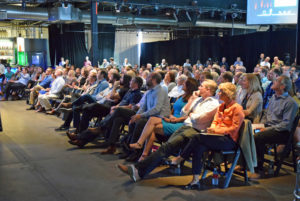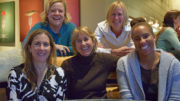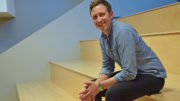DENVER, CO – “When they came to us, they were not people who were currently running a company,” Tom Higley, the founder of 10.10.10, told an audience of hundreds at the EXDO Event Center on June 30th. “They were not people who had raised a significant amount of capital to pursue something. They were not people who came to us with a team. They were not people who came to us with a specific idea.”
Higley was describing the ten entrepreneurs who had been chosen to participate in 10.10.10 Health 2016, an innovative business generator now in its second year of operation. After ten days of exploring the program’s ten wicked health problems – which included childhood obesity, Alzheimer’s disease, and toxic stress – the entrepreneurs of 10.10.10 Health 2016 had gathered at EXDO to reveal the market-driven solutions they had created.
“They came here because after having had previous success they knew they wanted to start a new venture,” Higley continued. “But they didn’t quite know what that was, and they were willing to devote some time and energy and attention to figuring it out.”
An ambitious attempt to accelerate the current transformation of the US healthcare system, 10.10.10 Health brings ten serial entrepreneurs together for ten days in Denver, Colorado, where it immerses them in wicked health problems like homelessness and chronic pain in the hopes of inspiring the development of companies dedicated to solving these problems. Notably, last year’s program led to the formation of BurstIQ, a health data startup, as well as Airstream Health, which is currently developing a platform to help small-and-medium-sized businesses improve the healthcare coverage they provide to employees.
“Despite what you’ve heard, no one will solve one of these wicked problems in ten days. But we would be absolutely thrilled to be able to say that something started here that resulted in the elimination of Alzheimer’s in ten years.”
Though not all of the entrepreneurs who presented at EXDO had developed a market-driven solution to a wicked health problem, each of them seemed to have been inspired by the multitude of opportunities for innovation present within the healthcare system. Among those who were still considering their solutions, Brendan Marshall had become interested in enhancing access to health data for entrepreneurs. Pam Nurrie had identified costly surgery cancellations as a potentially lucrative problem. And Spencer Hutchins was contemplating how best to extend the reach of mental health services through digital technology.
But, in a promising sign for the program, the large majority of those who took part in 10.10.10 Health 2016 had devised products or services around which they were willing to form companies. Hector Rodriguez was designing a conversational interface that could provide teenagers with health advice, while Doug Kittelsen was building a platform to support the millions of unpaid caregivers in America. Phillip Stehlik planned to use chatbots to encourage people to get help for depression, and Majid Boroujerdi wanted to use the internet to connect the elderly with individuals who needed advice. Intriguingly, Dr. Kenneth Bellian had developed a smart home solution for those living with Alzheimer’s, though he declined to go into too much detail in order to protect his intellectual property.
“One out of ten babies born in the US are premature or underweight,” Cathy Caplener informed the audience at EXDO during what was perhaps the afternoon’s most moving presentation. “We can’t change the amount of babies born this way, but we can change their environment, the incubator.” Caplener then described the solution she had devised, a modified incubator that uses audio, video, and other technologies to give babies the feeling that their mothers are near.
Yet of all the entrepreneurs who took part in 10.10.10 Health 2016, Eric Marcoullier seemed the closest to forming a company. During the ten days of this year’s program, Marcoullier had laid the groundwork for an artificially intelligent companion for the elderly that could be accessed through a virtual reality headset.
“It’s happening,” Marcoullier told the audience. “It’s on. We’re building this, we’re testing it, and I’m already talking to investors. Thanks to 10.10.10 for showing me how flawed this industry is, and for inspiring me to do something about it.”
Like the coverage that CyberMed News provides? Follow us on Twitter, LinkedIn, and Facebook to make sure you keep up to date on the most recent developments in digital health.






Be the first to comment on "The Entrepreneurs of 10.10.10 Health 2016 Reveal Their Solutions"